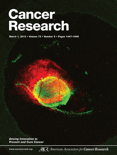
DRUG RESISTANCE UPDATES
Scope & Guideline
Empowering professionals with vital research findings.
Introduction
Aims and Scopes
- Mechanisms of Drug Resistance:
The journal extensively covers the underlying biological mechanisms that lead to drug resistance, including genetic mutations, epigenetic modifications, and metabolic adaptations. - Therapeutic Strategies:
Research published in this journal often explores novel therapeutic strategies aimed at counteracting drug resistance, such as combination therapies, targeted therapies, and the use of nanomedicine. - Clinical Implications:
The journal emphasizes the clinical relevance of drug resistance, providing insights into how resistance affects treatment outcomes and guiding clinical decision-making. - Emerging Technologies:
There is a strong focus on the application of cutting-edge technologies such as CRISPR, single-cell sequencing, and artificial intelligence in understanding and combating drug resistance. - Multidisciplinary Approaches:
Research articles often adopt a multidisciplinary approach, integrating molecular biology, pharmacology, and clinical research to provide a comprehensive understanding of drug resistance.
Trending and Emerging
- Cancer Immunotherapy Resistance:
As immunotherapy becomes a cornerstone of cancer treatment, understanding and overcoming resistance to these therapies is increasingly important, leading to a rise in relevant publications. - Metabolic Adaptations in Resistance:
Research exploring how cancer and microbial pathogens adapt their metabolism to survive drug treatments is on the rise, highlighting the critical role of metabolic pathways in resistance. - Nanotechnology in Overcoming Resistance:
The use of nanotechnology to develop novel drug delivery systems and formulations that can overcome resistance mechanisms is an emerging focus, promising innovative therapeutic strategies. - Role of the Tumor Microenvironment:
Studies examining how the tumor microenvironment influences drug resistance are gaining traction, emphasizing the complex interactions between cancer cells and their surroundings. - CRISPR and Genetic Editing Technologies:
The application of CRISPR and other genetic editing tools to study and potentially reverse drug resistance mechanisms is a growing area of interest, reflecting advancements in research methodologies.
Declining or Waning
- Basic Mechanisms of Resistance:
Research focused solely on the basic molecular mechanisms of drug resistance, without linking to therapeutic applications or clinical outcomes, has seen a decline as the field pivots towards more applied research. - Single-Agent Resistance Studies:
There is a noticeable decrease in studies that examine resistance mechanisms in isolation. The trend is shifting towards understanding drug resistance in the context of combination therapies. - Traditional Antimicrobial Resistance:
While antimicrobial resistance remains a critical issue, papers focusing on traditional antibiotics without exploring innovative solutions or novel agents are becoming less frequent. - Historical Perspectives on Drug Resistance:
The journal has moved away from publishing articles that primarily provide historical perspectives on drug resistance, as newer research emphasizes current challenges and forward-looking solutions. - Resistance in Non-Cancerous Diseases:
There has been a reduction in the scope of research pertaining to drug resistance in non-cancerous diseases, indicating a narrowing focus primarily on cancer-related drug resistance.
Similar Journals

BIOCHIMICA ET BIOPHYSICA ACTA-GENERAL SUBJECTS
Elevating Knowledge in Biochemistry and BiophysicsBIOCHIMICA ET BIOPHYSICA ACTA-GENERAL SUBJECTS, published by Elsevier, serves as a pivotal journal in the fields of biochemistry and biophysics, with a long-standing history dating back to 1956. This esteemed publication, bearing the ISSN 0304-4165 and E-ISSN 1872-8006, continuously contributes to advancing our understanding of complex biological processes through rigorous research articles and reviews. It notably holds a distinguished position with a Q2 classification in Biochemistry and a Q1 ranking in Biophysics for 2023, reflecting its high relevance and impact within these scientific domains. The journal is also recognized within the Scopus metrics, taking a rank of #40 out of 152 in Biophysics and #173 out of 438 in Biochemistry, thus placing it in the 74th and 60th percentiles respectively. Academics and professionals in the life sciences will find this journal an essential resource for current research, cutting-edge techniques, and comprehensive reviews aimed at enhancing the understanding of biological functions. While BIOCHIMICA ET BIOPHYSICA ACTA is not an open-access journal, it remains a cornerstone publication for those seeking to stay at the forefront of biochemical and biophysical research.

Cancer Drug Resistance
Transforming Oncology: Tackling Drug Resistance Head-On.Cancer Drug Resistance is a premier journal published by OAE PUBLISHING INC, focusing on the critical field of oncology and pharmacology. Since its inception in 2018, the journal has been at the forefront of presenting innovative research aimed at understanding and overcoming drug resistance in cancer therapy. With an impressive impact factor reflected in its Q2 ranking in Cancer Research and a Q1 ranking in Pharmacology (medical) for 2023, Cancer Drug Resistance serves as a vital resource for researchers, clinicians, and students who are dedicated to advancing cancer treatment and improving patient outcomes. The journal's commitment to disseminating high-quality, peer-reviewed articles underscores its importance within the academic and medical communities. While it operates on an open-access model, facilitating widespread distribution and access to crucial research findings, the journal continuously strives to foster dialogue and collaboration among stakeholders in cancer research and pharmacology. Its mission is clear: to shine a light on the evolving challenges and breakthroughs in drug resistance, paving the way for enhanced therapeutic strategies and clinical solutions.

CANCER RESEARCH
Exploring the depths of cancer prevention and diagnosis.Cancer Research, published by the American Association for Cancer Research, is a premier journal in the field of oncology, renowned for its commitment to advancing cancer research since its inception in 1941. With an impressive impact factor reflecting its vital role in the field, this journal consistently ranks in the Q1 quartile for both Cancer Research and Oncology, positioning it among the top 7.5% of journals in these categories. The journal serves as a crucial platform for researchers, professionals, and students to disseminate and gain insights into groundbreaking studies that shape our understanding of cancer biology, prevention, diagnosis, and treatment. While it is not an open-access publication, its rigorous peer-review process ensures that only high-quality research is published, thus maintaining a standard of excellence in the scientific community. With a strong legacy and an ever-expanding influence, Cancer Research continues to be essential for anyone dedicated to the fight against cancer, showcasing cutting-edge research that drives scientific discovery and innovation.

INTERNATIONAL JOURNAL OF ONCOLOGY
Transforming discoveries into impactful cancer solutions.INTERNATIONAL JOURNAL OF ONCOLOGY is a leading academic publication dedicated to advancing the field of cancer research and treatment. Published by SPANDIDOS PUBL LTD in Greece, this journal, with ISSN 1019-6439 and E-ISSN 1791-2423, has established itself as a reputable source of peer-reviewed articles since its inception in 1993. With an impressive Q2 ranking in both Cancer Research and Oncology categories, as well as high Scopus ranks reflecting its significant contribution to the fields of Medicine and Biochemistry, the journal offers a platform for researchers, clinicians, and students alike to disseminate their findings and engage in dialogue surrounding innovative practices and breakthroughs. Although the journal follows a traditional subscription model, it continues to attract a diverse readership interested in the latest developments in oncological research, providing essential insights into cancer biology, therapeutics, and patient care. With a commitment to excellence, the INTERNATIONAL JOURNAL OF ONCOLOGY plays a vital role in shaping the future of oncology research and is a must-read for anyone passionate about advancing cancer treatment and prevention.

Discovery Medicine
Fostering a vibrant dialogue in the world of medical sciences.Discovery Medicine, an esteemed journal published by Discovery Medicine, serves as a vital platform within the field of general medicine, dedicated to advancing knowledge through high-quality research and innovative insights. With its ISSN 1539-6509 and E-ISSN 1944-7930, this journal boasts an impressive Scopus ranking of #29 out of 529 in the general medicine category, positioning it at the 94th percentile, indicating its significant contribution to the medical sciences. While operating as a subscription-based journal, Discovery Medicine fosters an environment where researchers and professionals can disseminate their findings and engage with cutting-edge developments in medicine. Spanning topics that bridge clinical practice and healthcare advancements, this journal aims to inform, challenge, and inspire the medical community. The journal has converged its volumes from 2006 to 2007 and again from 2009 to 2018, highlighting its sustained commitment to excellence even as coverage has temporarily discontinued in Scopus. Situated at 10 Gerard Ave, Ste 201, Timonium, MD 21093, Discovery Medicine continues to be a cornerstone for medical scholars, offering a rich repository of knowledge essential for ongoing research and practical applications.

CANCER GENE THERAPY
Innovating Genetic Solutions for OncologyCancer Gene Therapy, published by SpringerNature, stands at the forefront of research in the fields of cancer research, molecular biology, and molecular medicine. With a robust impact factor reflecting its significant influence—ranking in the Q2 category for cancer research and Q1 for both molecular biology and molecular medicine—it serves as an essential resource for scholars and practitioners alike. Since its inception in 1994, the journal has dedicated itself to advancing the understanding and therapeutic application of genetic innovations in oncology. Notably, it holds distinguished Scopus ranks, placing it among the top tier journals in its categories, underscoring its importance to the scientific community. While open access options are not available, the compelling research published here offers invaluable insights into the latest advancements and strategies in cancer therapy. Engaging with *Cancer Gene Therapy* not only keeps professionals informed but also inspires future innovations in the quest for effective cancer treatments.

International Journal of Molecular and Cellular Medicine
Unveiling New Horizons in Cellular and Molecular BiologyInternational Journal of Molecular and Cellular Medicine, published by the CELLULAR & MOLECULAR BIOLOGY RESEARCH CENTER in Iran, is a leading platform dedicated to advancing research in various domains of molecular and cellular sciences. With an ISSN of 2251-9637 and E-ISSN 2251-9645, this journal features a rigorous peer-review process that ensures the publication of high-quality, impactful research. Spanning from 2016 to 2024, it is categorized in the third quartile (Q3) in Biochemistry, Cell Biology, Genetics, and Molecular Biology, and second quartile (Q2) in Biotechnology, underlining its significance in the scientific community. Although currently non-open access, it maintains credible visibility through Scopus rankings, reflecting its importance in fields such as Biochemistry, Molecular Medicine, and Genetics, where it holds respectable ranks and percentiles. This journal aims to foster collaboration and knowledge dissemination among researchers, professionals, and students in the pursuit of enhancing understanding and innovation in molecular and cellular medicine.

CANCER AND METASTASIS REVIEWS
Unraveling the Mysteries of Cancer DynamicsCancer and Metastasis Reviews, published by Springer, is a leading journal in the field of oncology and cancer research. With an impressive impact factor placing it in the Q1 category for both Cancer Research and Oncology as of 2023, this journal is ranked 29th out of 404 in Medicine, Oncology, and 22nd out of 230 in Biochemistry, Genetics, and Molecular Biology, reflecting its significant influence and prestige in the academic community. Established in 1982, the journal covers a wide spectrum of topics related to the mechanisms of cancer progression and metastasis, making it an essential resource for researchers, healthcare professionals, and students dedicated to understanding and tackling cancer. Although the journal does not provide open access options, the impactful research it publishes contributes to advances in therapeutic strategies and enhances the collective knowledge surrounding cancer pathophysiology. With research converging from 1982 to 2024, Cancer and Metastasis Reviews continues to be a vital platform for disseminating high-quality scientific information in the ever-evolving landscape of cancer research.

CANCER SCIENCE
Leading the charge in innovative cancer treatment solutions.Cancer Science, an esteemed journal published by Wiley, stands at the forefront of oncology research, boasting an impressive impact factor and a classification in the Q1 category for its contributions in Cancer Research, Medicine, and Oncology as of 2023. Since its inception in 2003 and transitioning to an Open Access model in 2014, the journal has facilitated global dissemination of critical research findings, ensuring that vital information remains accessible to researchers, clinicians, and students alike. With its comprehensive scope covering cutting-edge discoveries in cancer biochemistry, genetics, and molecular biology, Cancer Science is recognized for its rigorous peer-review process and significant contributions to advancing our understanding of cancer. The journal, located at 111 River St, Hoboken, NJ, is an essential resource for anyone dedicated to improving treatment outcomes and pushing the boundaries of cancer research.

INTERNATIONAL JOURNAL OF CANCER
Leading the charge in innovative cancer solutions.INTERNATIONAL JOURNAL OF CANCER, published by Wiley, stands as a premier platform for the dissemination of cutting-edge research in the fields of cancer research and oncology. With an impressive impact factor reflecting its rigorous peer-review process and significant contribution to the scientific community, this journal is categorized in Q1 for both Cancer Research and Oncology as of 2023. It boasts notable rankings, being placed 38th among 404 journals in Medicine - Oncology and 32nd among 230 in Biochemistry, Genetics, and Molecular Biology - Cancer Research, positioning it within the 90th and 86th percentiles, respectively. Since its inception in 1966 and continuing to 2024, the journal has played a pivotal role in advancing our understanding of cancer biology, treatment modalities, and innovative therapeutic approaches. While it operates under a subscription model, the journal is committed to making valuable research accessible to a broader scientific audience. Researchers, professionals, and students alike will find the INTERNATIONAL JOURNAL OF CANCER an essential resource for staying abreast of the latest advancements in cancer science.